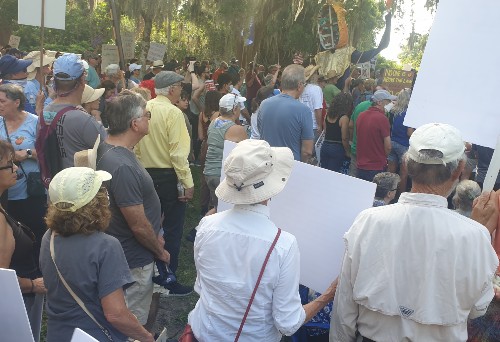
The “Baker” explosion, part of Operation Crossroads, a nuclear weapon test by the United States military at Bikini Atoll, Micronesia, on 25 July 1946. [Source: Wikipedia]
As I write this, US president Donald Trump seems deep in his usual dither. Trump, according to the Wall Street Journal, “told senior aides late Tuesday [June 17] that he approved of attack plans for Iran, but was holding off to see if Tehran would abandon its nuclear program.”
So, OK, we’re used to that: Tariffs! Wait, no tariffs! Wait, reduced tariffs! Mass deportations! Wait, not farm workers, maids, and waiters! Wait, them too!
War on Iran, though, isn’t so much a matter of changing his mind as whether he’s out of his mind. It’s an evil and risky proposition with no moral or practical up side, and a trigger far more difficult to un-pull than tariffs or deportations. That he’s even considering it makes a strong case for his removal from office via the 25th Amendment.
If there’s any lesson to learn from two decades of US and Israeli pressure on Iran to shut down a non-existent “nuclear weapons program,” starting with economic sanctions and leading inevitably to Israeli airstrikes and open war on the apt date of Friday the 13th, it’s that an Iran with nuclear weapons just might be the best option if the goal is to calm down the Middle East.
Iraq’s Saddam Hussein gave up his nuclear ambitions, after which the US invaded and occupied his country and killed him.
Libya’s Muammar Gaddafi gave up his nuclear ambitions, after which NATO invaded and occupied his country and killed him.
North Korea’s Kim Jong Il and Kim Jong Un saw their nuclear ambitions through to testing and fielding a nuclear arsenal, after which those who might have otherwise supported invading and occupying North Korea and killing its ruler cooled their jets. Not really “peace,” but clearly a better option than open war.
On the subject of nuclear weapons, the Iranian regime has proven itself not just compliant, but obsequiously so, through decades of broken promises and renewed lies about its ambitions, only throwing up its hands and saying “fine, we’ll enrich uranium to weapons grade purity” after multiple broken promises by, among others, Donald Trump, and only to get its opponents to start holding up THEIR end of the 2015 “Iran nuclear deal.”
The Iranian regime, a theocracy, even observes a religious proscription on building nukes per a fatwa from its “Supreme Leader.”
In return, the Iranian regime got a narrow range of responses, from economic isolation to open war.
Fatwas are merely legal rulings on points of Islamic law. Their authors might reverse themselves. Ali Khamenei should.
If the Pakistani regime announced a gift of three nuclear-armed Shaheen III missiles to the Iranian regime, with one put immediately under Iranian operational control until the others can be moved to and sited in Iran, the war would likely come to a screeching halt.
Mutual Assured Destruction has its down sides, but at this point it seems like the best option for cooling down US/Israeli war fever and seeking a re-set based on honest dealing instead of threats.
Thomas L. Knapp (X: @thomaslknapp | Bluesky: @knappster.bsky.social | Mastodon: @knappster) is director and senior news analyst at the William Lloyd Garrison Center for Libertarian Advocacy Journalism (thegarrisoncenter.org). He lives and works in north central Florida.
PUBLICATION/CITATION HISTORY


